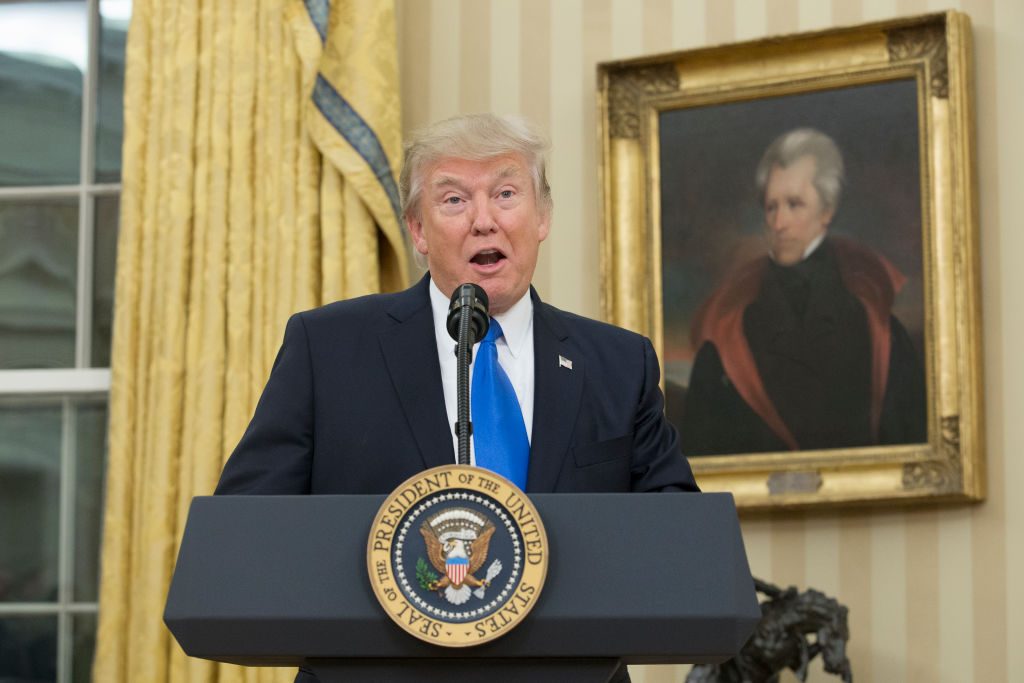President Trump has long invited comparisons to Andrew Jackson, the founder of the Democratic Party and the first populist commander in chief. Yet it wasn’t until yesterday evening that he pulled off his most Jacksonian move yet by firing Lisa Cook, a member of the Board of Governors of the Federal Reserve, ostensibly because she engaged in alleged mortgage fraud.
The media, of course, is in a state of alarm over an “unprecedented move” that “shatters long-standing protections meant to keep the Fed independent”. Investors are dumping the dollar in response, much as Trump’s Liberation Day tariffs were initially greeted with a stock sell-off before equity markets chilled out and rebounded. Meanwhile, Cook herself has already rejected Trump’s authority to remove her from the board, almost certainly setting up litigation.
Americans now face a battle royale between the presidency and central bankers which, far from being unprecedented, should be familiar to students of the early republic. That’s when Jackson, known as “Old Hickory”, went to war against the Second Bank of the United States, the spiritual if not direct predecessor of the modern Federal Reserve.
At issue, now as then, is whether the shape and management of US currency and the money supply should be subject to democratic contestation — or left to the supposedly “neutral” determination of expert bankers.
As Jackson rose in business and politics, he became a spokesperson for entrepreneurs who felt shut out of the economy by the Eastern commercial and banking establishment. This group, as well as smallholders in the South and West, helped catapult him to the Oval Office amid a general atmosphere of disaffection in 1820s America.
It was the “money power” — a coinage of Thomas Hart Benton, a onetime duelling opponent turned Jackson disciple in the Senate — that most exercised the emerging Democrats, and that money power was embodied in the Second Bank of the United States. Congressionally chartered, the BUS functioned simultaneously as a depository for federal funds, a central bank, and a profiteering actor in the money market.
Taxpayers supplied a fifth of its assets under management, and the government appointed a proportional share of its board members. What irked Jackson and the Jacksonians was that the Bank was a partly public institution yet largely resisted political control. It even used its immense resources to shape democratic outcomes in favour of the wealthy, openly propagandising against Jackson and withholding loans from his political allies.
In 1832, just as Jackson was coming up for re-election, the Bank applied to renew its charter, and Congress obliged. In response, Old Hickory issued the most famous presidential veto of all time. “It is to be regretted that the rich and powerful can too often bend the acts of government to their selfish purposes,” he wrote. When the government compounds the advantages of the asset-rich “with grant titles, gratuities, and exclusive privileges, … the humble members of society … have a right to complain of the injustice of their government”.
The Bank War soon reached its climax. Having prevented renewal, Jackson set out to remove existing federal deposits from the BUS and place them with favoured state banks. In response, the Bank’s then-President caused a national money crunch by calling in loans and tightening credit as a means to bring Jackson to heel. “The Bank is trying to kill me,” Jackson famously declared. “But I will kill it.”
And so he did. Yet the immediate outcome of the war was far from encouraging. Corrupt though it was, the BUS did a decent job of maintaining a responsible flow of credit for the nascent republic. Its demise led first to a spurt of inflationary wildcat banking, as the state banks issued notes by the wheelbarrow, and later a minor depression.
The United States suffered far more banking crises through the 19th century than did comparable industrial states, such as Britain and France, with more centralised banking systems. That period ended with the establishment of the Federal Reserve System in 1913, yet the fundamental problems which led to the first Bank War — the unaccountable power of central bankers, the quease-inducing combination of public and private authority — are still with us. If the government endows an institution like the Fed with its authority, why should its officeholders be beyond the reach of the democratically elected president?
Today’s Democrats, nominal heirs to the party of Jackson, are likely to line up behind the Fed, essentially reprising the role of early-republic elites and anti-Jacksonian politicians. But somewhere, Old Hickory is smiling a mischievous smile.











Join the discussion
Join like minded readers that support our journalism by becoming a paid subscriber
To join the discussion in the comments, become a paid subscriber.
Join like minded readers that support our journalism, read unlimited articles and enjoy other subscriber-only benefits.
Subscribe